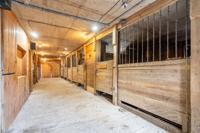Real eState
Two new books trace Vancouver's old real estate game – The Globe and Mail
Vancouver author Jesse Donaldson has just published Land of Destiny: A History of Vancouver Real Estate.
Brendan Riggs/Brendan Riggs
Vancouver has always had a pretty disreputable past when it comes to the real estate game of flipping properties for fast profit. Around the turn of the 20th century, even English writer Rudyard Kipling reportedly got in on the game when he visited Vancouver and purchased properties on Fraser Street, then known as Scott Street, as well as property on the North Shore.
According to Jesse Donaldson, author of Land of Destiny: A History of Vancouver Real Estate, the Jungle Book author returned to the rapidly growing city to find that he’d been scammed out of his investment. He’d purchased from a scoundrel named “Steve,” and insiders knew that you should never buy real estate from “Steve,” Mr. Donaldson said.
“The rules of the game haven’t changed, and the way it operates haven’t changed much at all,” he says. “The only question now is who is doing it and where they are from.”
Like many of his generation, Mr. Donaldson, a millennial, is angered by the affordability crisis of Metro Vancouver. The Richmond-raised writer says he has found security in co-op housing, and doubts he’ll ever own a freehold property. But he still wanted to know how he and many of his friends had lost the option to own. He wanted to help his generation understand how the gap between incomes and real estate prices got so absurdly wide. His book is the result, and it is one of two that came out in the last year revealing a dark side to a city that usually gets celebrated as one of the world’s most livable. Mr. Donaldson, for one, doesn’t buy into that hype.
After nearly a year of research, he discovered that the city’s cozy relationship with property development goes back to its founding, more than 130 years ago. Foreign buying and the local wealth and tax revenues made from frenzied development is nothing new. Foreign buyers from Britain and the United States flooded into the province from 1908 to 1913. In the building boom of 1912, there was one realtor for every 100 citizens, according to his book. Half of Vancouver’s city council were in the real estate business, including the mayor, an American-born realtor named Charles Stanford Douglas. That same year the city had revenue of $19-million from the issuance of building permits. He tells how politicians and Canadian Pacific Railway employees with inside knowledge made vast sums of money as they speculated on properties ripe for development.
He also details a federal loan effort to create semi-detached row housing for First World War veterans, bungled by the city when it instead promoted bungalows on private lots, sold at market rates.
“We’ve had an interesting approach in this country; allowing people to do stuff because they have a lot of money and [government] wants investment – but they don’t want to regulate those interactions in any way. And so, you get the mess we’re in now,” Mr. Donaldson said.
The beginnings of the current mess, he says, can be traced back to the 1980s when government began courting Asian wealth in earnest. One of Mr. Donaldson’s sources is University of British Columbia geography professor David Ley, who wrote about the government’s intentional courting of Asian investment in his book, Millionaire Migrants: Trans-Pacific Life Lines.
The Pacific strategy culminated with Expo 86, as “place marketing” for the Vancouver region, Mr. Donaldson said.
“It was a ton of taxpayer money that put on a big showing for rich people to invest, and they did. They were given supergood sweetheart deals that nobody else could compete with,” he said. “It worked very well, so a lot of the same people came together and did the whole thing again for the 2010 Olympics. They were basically two big marketing campaigns for the real estate industry.”
The federal government accelerated the process by launching in 1986 the immigrant investor program to wealthy foreign investors who could obtain citizenship in exchange. The program was shut down, but Quebec has its own program, which is temporarily suspended.
Despite Vancouver’s storied history of speculation, Mr. Donaldson says that the government lost control this time when it invited such tremendous foreign wealth, without regulation in place.
Mr. Donaldson says the “build-more-market-housing” approach the city has taken hasn’t worked. False Creek South, built in the 1970s and 1980s, is a widely praised model that achieved long-term affordability, but that involved all three levels of government working together. Since False Creek South, government has mostly left it to the market to supply affordable housing.
“What happens is no affordable housing gets built and they just end up lining their pockets with whatever subsidies they got. That’s happened multiple times. So if these strategies haven’t worked yet over 100-plus years, why would they start working now?”
UBC School of Architecture and Landscape professor Patrick Condon also published a book in the past year, called Five Rules for Tomorrow’s Cities, and although it’s more of an examination of the design of cities amid demographic change, a chunk of the book focuses on Vancouver. Prof. Condon relocated to Vancouver from the University of Minnesota for his UBC teaching position in 1992.
“Vancouver now presents an attractive but largely false image to the world, an image that suggests comfortable citizens housed in gleaming glass towers enjoying brilliant mountain views,” he writes. “Unfortunately, this image conceals the reality where many of those high-rise units sit empty – nothing but ‘cash boxes in the sky’ for investors – while wage earners crowd into small apartments, often devoting well over 50 per cent of their after-tax income to rent.”
He argues that in Vancouver, cost of land gets in the way of affordability, and when the city adds density to a neighbourhood and encourages land assemblies, it is only increasing the price per square foot. Instead, he suggests a missing middle solution on a typical sized lot where five or six units could be built, with a couple of non-market units required to mitigate any speculation. Splitting up, or hiving, a detached-house property is the alternative to building an unaffordable duplex or a tower, and it doesn’t involve the wasteful razing and redevelopment of the entire city. If widespread, it could contribute significant density.
Whatever the answer to the housing crisis, it’s especially crucial that we work it out now, as we’ve seen during the pandemic that lack of central housing has put front-line workers at serious disadvantage. Low wages and long commutes have put people at risk of contracting the disease, Prof. Condon says. Ironically, white-collar workers who can afford to live centrally can also afford to work at home, out of harm’s way.
“Inequality seems to be the vector for the disease and unavoidable exposure to other people who may be carriers for the disease for those front-line workers who have no choice but to confront many, many people throughout the working day,” Prof. Condon said in an interview. “It has become so obvious now that we should re-examine the overall strategy of how we distribute jobs and housing and transportation, so that our region is more socially equitable as well as resilient against future health threats – not just to workers but to everybody.”
Prof. Condon encourages urban planners to join in on a revival in non-market housing, which has become unfashionable in the past 50 years.
Mr. Donaldson also looks to senior government to get back to protecting its citizens with robust housing programs. As to why government didn’t intervene sooner, before we entered crisis mode, he can’t help but be cynical.
“We were just a bit naive to the effects of what would happen when such major players came around. People who are really, really rich are unscrupulous and used to getting around the regulation, and we didn’t think it was possible that it could get as crooked as it did, because we weren’t used to it at that level.
“There have been plenty of people who’ve raised the alarm about it over the years. … And it seemed silly that nobody really noticed for as long as they did, because it had been happening for so long, the exact same pattern writ large.
“The most charitable interpretation that I have is that they didn’t ask any questions because they didn’t want the faucet of money to get turned off.”
Economist Mohamed El-Erian says that the coronavirus shutdown will create a buyer’s market for real estate, offset by reduced incomes putting stress on the whole sector. El-Erian was in conversation with Rudyard Griffiths from the Munk Debates. The Globe and Mail
Your house is your most valuable asset. We have a weekly Real Estate newsletter to help you stay on top of news on the housing market, mortgages, the latest closings and more. Sign up today.
Real eState
Waterdown home listed for $2M offers 'rural-style living' – Hamilton Spectator
/* OOVVUU Targeting */
const path = ‘/business/real-estate’;
const siteName = ‘thespec.com’;
let domain = ‘thestar.com’;
if (siteName === ‘thestar.com’)
domain = ‘thestar.com’;
else if (siteName === ‘niagarafallsreview.ca’)
domain = ‘niagara_falls_review’;
else if (siteName === ‘stcatharinesstandard.ca’)
domain = ‘st_catharines_standard’;
else if (siteName === ‘thepeterboroughexaminer.com’)
domain = ‘the_peterborough_examiner’;
else if (siteName === ‘therecord.com’)
domain = ‘the_record’;
else if (siteName === ‘thespec.com’)
domain = ‘the_spec’;
else if (siteName === ‘wellandtribune.ca’)
domain = ‘welland_tribune’;
else if (siteName === ‘bramptonguardian.com’)
domain = ‘brampton_guardian’;
else if (siteName === ‘caledonenterprise.com’)
domain = ‘caledon_enterprise’;
else if (siteName === ‘cambridgetimes.ca’)
domain = ‘cambridge_times’;
else if (siteName === ‘durhamregion.com’)
domain = ‘durham_region’;
else if (siteName === ‘guelphmercury.com’)
domain = ‘guelph_mercury’;
else if (siteName === ‘insidehalton.com’)
domain = ‘inside_halton’;
else if (siteName === ‘insideottawavalley.com’)
domain = ‘inside_ottawa_valley’;
else if (siteName === ‘mississauga.com’)
domain = ‘mississauga’;
else if (siteName === ‘muskokaregion.com’)
domain = ‘muskoka_region’;
else if (siteName === ‘newhamburgindependent.ca’)
domain = ‘new_hamburg_independent’;
else if (siteName === ‘niagarathisweek.com’)
domain = ‘niagara_this_week’;
else if (siteName === ‘northbaynipissing.com’)
domain = ‘north_bay_nipissing’;
else if (siteName === ‘northumberlandnews.com’)
domain = ‘northumberland_news’;
else if (siteName === ‘orangeville.com’)
domain = ‘orangeville’;
else if (siteName === ‘ourwindsor.ca’)
domain = ‘our_windsor’;
else if (siteName === ‘parrysound.com’)
domain = ‘parrysound’;
else if (siteName === ‘simcoe.com’)
domain = ‘simcoe’;
else if (siteName === ‘theifp.ca’)
domain = ‘the_ifp’;
else if (siteName === ‘waterloochronicle.ca’)
domain = ‘waterloo_chronicle’;
else if (siteName === ‘yorkregion.com’)
domain = ‘york_region’;
let sectionTag = ”;
try
if (domain === ‘thestar.com’ && path.indexOf(‘wires/’) = 0)
sectionTag = ‘/business’;
else if (path.indexOf(‘/autos’) >= 0)
sectionTag = ‘/autos’;
else if (path.indexOf(‘/entertainment’) >= 0)
sectionTag = ‘/entertainment’;
else if (path.indexOf(‘/life’) >= 0)
sectionTag = ‘/life’;
else if (path.indexOf(‘/news’) >= 0)
sectionTag = ‘/news’;
else if (path.indexOf(‘/politics’) >= 0)
sectionTag = ‘/politics’;
else if (path.indexOf(‘/sports’) >= 0)
sectionTag = ‘/sports’;
else if (path.indexOf(‘/opinion’) >= 0)
sectionTag = ‘/opinion’;
} catch (ex)
const descriptionUrl = ‘window.location.href’;
const vid = ‘mediainfo.reference_id’;
const cmsId = ‘2665777’;
let url = `https://pubads.g.doubleclick.net/gampad/ads?iu=/58580620/$domain/video/oovvuu$sectionTag&description_url=$descriptionUrl&vid=$vid&cmsid=$cmsId&tfcd=0&npa=0&sz=640×480&ad_rule=0&gdfp_req=1&output=vast&unviewed_position_start=1&env=vp&impl=s&correlator=`;
url = url.split(‘ ‘).join(”);
window.oovvuuReplacementAdServerURL = url;
#HamOntHouseHunt is a regular feature looking at houses for sale in the Hamilton area market. Have a tip? Email us at fhewitt@torstar.ca.
Price $1,999,900

The fully functional barn located on the property of 694 Centre Rd. in Waterdown.

The kitchen of 694 Centre Rd. in Waterdown.

The primary bedroom of 694 Centre Rd. in Waterdown.

The back deck of 694 Centre Rd. in Waterdown.
Real eState
Former HGTV star slapped with $10 million fine and jail time for real estate fraud – Fortune


Back when mortgage rates and home prices were more reasonable and manageable, homeowners invested in fixer-upper properties and made them their own. Now these types of projects aren’t as popular. But in the early-to-mid-2010s, HGTV shows including Fixer Upper, Love It or List It, and Flip It to Win It were all the rage as viewers binge-watched dilapidated homes transform into dream properties.
But as it turns out, one former HGTV star’s house-flipping show was masking major real estate fraud. On Tuesday, Charles “Todd” Hill, was sentenced to four years in jail and ordered to pay back nearly $10 million to his victims following his conviction. Los Gatos, Calif.–based Hill, 58, was the star of HGTV show Flip It to Win It, which aired in 2013 and featured Hill and his team purchasing dilapidated homes and fixing them up. Hill then sold them for a profit.
“Some see the huge amount of money in Silicon Valley real estate as a business opportunity,” Santa Clara County District Attorney Jeff Rosen said in a statement. “Others, unfortunately, see it as a criminal opportunity—and we will hold those people strictly accountable.”
What did Hill do?
According to the indictment shared with Fortune, the accusations against Hill happened between 2012 and 2014, around the time his show (which lasted just one season) began. The indictment shows 10 counts of grand theft of personal property exceeding $950,000; three counts of embezzlement; and one count of diversion of construction funds. Hill could not be reached by Fortune to comment on the indictment, conviction, or sentencing.
Hill was convicted last year of the multiple fraud schemes, including scams that happened before his show aired. This included a Ponzi scheme with evidence showing that Hill had spent laundered money on a rented apartment in San Francisco, hotels, vacations, and luxury cars, according to a press release from the Santa Clara County District Attorney’s Office. HGTV did not respond to requests for comment from Fortune ahead of publication.
“To hide the theft, he created false balance sheets and got loans using fraudulent information,” according to the district attorney’s office. In another case, Hill diverted construction money for personal use. But one of the strangest accounts came from an investor who had poured $250,000 into a property he wanted Hill to remodel.
Instead, during a tour of the home, the investor “found it to be a burnt-down shell with no work done on it.”
After the district attorney’s investigation, Hill was indicted in November 2019 and in September 2023 admitted his guilt and was convicted by plea of grand theft against all of his victims. He’ll have to pay restitution of more than $9.4 million and serve 10 years on probation.
Victims who spoke at Tuesday’s hearing said they’re still reeling from the financial and professional damages from the fraud, according to the district attorney’s office.
Real eState
Botched home sale costs Winnipeg man his right to sell real estate in Manitoba – CBC.ca


A Winnipeg man’s registration as a real estate salesman has been cancelled after a family vacated their home on a tight deadline for a sale that never went through, then changed brokerages and, months later, got $60,000 less for their house than what they expected when they moved out.
A Manitoba Securities Commission panel found Reginald Wayne Kehler engaged in professional misconduct and conduct unbecoming a registrant when he signed a document on behalf of sellers without their knowledge, reduced the listing price of a home without their approval, and didn’t tell them for nearly a month that a potential buyer hadn’t paid a promised $100,000 deposit.
The sellers, identified as D.R. and P.R. in the panel decision released Wednesday, were awarded $10,394 from the real estate reimbursement fund. Kehler was ordered to pay $12,075 to cover costs of the investigation and hearing.
The sellers were a military family who had to move in 2020 after the husband was posted to Ottawa.
They chose Kehler as their listing agent, because he had helped them find the home when they moved to Winnipeg in 2018, and they had a good relationship with him, the panel’s decision says.
They listed their house in May and on June 15, 2020, accepted an offer of $570,000 with possession on July 15. A deposit of $100,000 was to be paid within 72 hours of acceptance of the offer.
Kehler was the salesperson for both the buyer and the sellers — but the sellers say he never told them that.
A form that indicated the sellers knew he was also representing the buyer, dated June 15, 2020, was filed.
While it appeared to be signed with the sellers’ names, they said they didn’t see it until March 2021. One of the two wasn’t even in Winnipeg on June 15.
“Kehler, in his interview with commission staff, acknowledges that the sellers never signed this document — we note that the purported signatures on the form look nothing like the actual signatures of the sellers on other documents,” the decision says.
Kehler told commission staff he’d been authorized to sign on the sellers’ behalf, which they denied. The panel found them more believable.
Once the deal was made, the sellers, believing they had just a month before the buyer would take possession of their home, quickly packed up and prepared to move with their two young children.
Buyer never made deposit
Meanwhile, the buyer hadn’t made the $100,000 deposit before the deadline — but Kehler didn’t tell the sellers.
Kehler told commission staff that was because he thought the deposit was still coming, and he didn’t want to cause more stress for the sellers.
On July 10, just five days before the buyer was to take possession and the day before the family was leaving Winnipeg, the sellers spoke to Kehler — but he still didn’t tell them the deposit hadn’t been paid.
Kehler “said everything was fine,” according to the decision.
It wasn’t until the evening of July 13, when the family arrived in Toronto on their way to Ottawa and just 36 hours before the scheduled closing, that Kehler told them he’d never received the deposit.
Eventually, they received $4,000 of the deposit, but the sale of the house never closed. The sellers scrambled to extend the insurance on their old home and make sure they continued to pay the utility bills, the decision says.
Home relisted
Kehler then recommended they relist the home, and it went back on the market at $574,900.
On Aug. 10, 2020, Kehler recommended the price be reduced to $569,900. Instead, the seller said he should reduce the price to $567,900.
But when the seller looked at the online listing on Aug. 22, it was listed at $564,900.
The sellers also asked Kehler about maintaining the property, since they were no longer in Winnipeg. He agreed he would, but friends ended up going and mowing the lawn, the decision says.
The sellers asked Kehler and his brokerage about what could be done to “make things right,” the decision says, but they never received any responses.
On Sept. 5, they hired a new brokerage to sell the home. Under the new real estate salesman, they accepted an offer on Dec. 13, and closed the deal Jan. 2, 2021, receiving $507,500 for the home.
Kehler’s actions were “contrary to the best interests of the public” and undermined “public confidence in the real estate industry,” the decision says.
-
Media22 hours ago
DJT Stock Rises. Trump Media CEO Alleges Potential Market Manipulation. – Barron's
-
Investment23 hours ago
Private equity gears up for potential National Football League investments – Financial Times
-
Real eState15 hours ago
Botched home sale costs Winnipeg man his right to sell real estate in Manitoba – CBC.ca
-
News21 hours ago
Canada Child Benefit payment on Friday | CTV News – CTV News Toronto
-
Business23 hours ago
Gas prices see 'largest single-day jump since early 2022': En-Pro International – Yahoo Canada Finance
-
Business15 hours ago
Dow Jones Rises But S&P, Nasdaq Fall; Nvidia, SMCI Flash Sell Signals As Bitcoin's Fourth Halving Arrives – Investor's Business Daily
-
Media23 hours ago
Three drones downed after explosions heard in Iran’s Isfahan: State media – Al Jazeera English
-



 Science20 hours ago
Science20 hours agoMarine plankton could act as alert in mass extinction event: UVic researcher – Langley Advance Times









